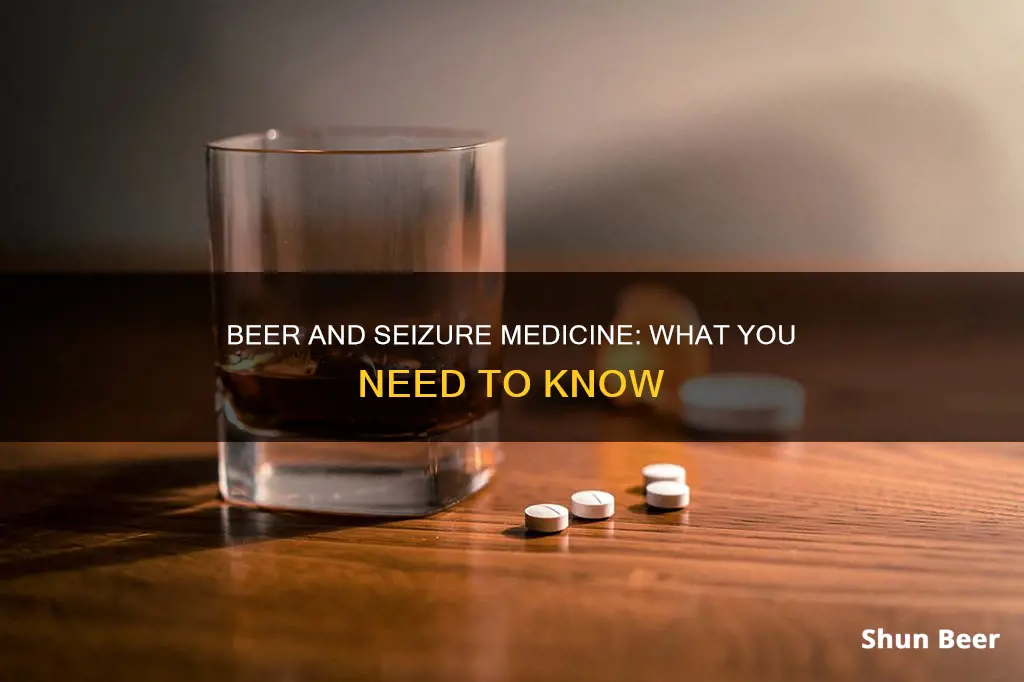
Drinking alcohol while taking seizure medication is a complex issue that depends on various factors, including the type of medication, the individual's alcohol tolerance, and their overall health. While occasional, small amounts of alcohol are generally considered safe for people with epilepsy, heavy drinking and binge drinking can increase the risk of seizures and negatively affect anti-seizure medications. It is crucial to consult a doctor or pharmacist for personalized advice regarding alcohol consumption while taking seizure medication.
What You'll Learn

Alcohol withdrawal can cause seizures
Alcohol withdrawal can indeed cause seizures, even in people without epilepsy. This is because when someone regularly consumes large amounts of alcohol, their brain chemistry adapts to the depressant effects of alcohol. This adaptation involves changes in neurotransmitter levels, particularly gamma-aminobutyric acid (GABA) and glutamate, which help regulate brain activity.
When alcohol consumption is abruptly stopped, the brain’s chemistry is thrown off balance. The absence of alcohol’s depressant effects leads to an overexcitation of the nervous system, as the brain continues to produce higher levels of excitatory neurotransmitters like glutamate. This hyperactivity can result in seizures, which are sudden, uncontrolled electrical disturbances in the brain.
Tonic-clonic seizures, also known as convulsions, are the most typical and severe type of seizure that occurs during alcohol withdrawal. They usually occur within 48 hours of the last drink but can happen at any time during the first week of withdrawal. Tonic-clonic seizures have two phases: the tonic phase, where the body stiffens and loses consciousness, and the clonic phase, where the arms and legs jerk rapidly and rhythmically.
It is estimated that 2 million Americans experience alcohol withdrawal each year, and up to one-third of them may experience seizures. The risk of seizures is higher after consuming three or more alcoholic drinks, and binge drinking and alcohol withdrawal can lead to status epilepticus, a potentially life-threatening condition.
If you are experiencing alcohol withdrawal, it is important to seek medical help, especially if you are at risk of seizures. Detoxification and withdrawal are best handled with the aid of medical professionals, especially if you have a severe or long-term addiction to alcohol.
Drinking Beer with Nocor: Is It Safe?
You may want to see also

Alcohol can negatively interact with seizure medication
Firstly, drinking alcohol can increase the risk of seizures. Alcohol can trigger seizures in people with epilepsy, particularly during alcohol withdrawal. This is because alcohol withdrawal can lead to abnormal electrical activity in the brain, which can cause seizures. Alcohol withdrawal can also lower the seizure threshold, making it easier for a seizure to occur.
Secondly, alcohol can interact with seizure medications in a way that increases the risk of seizures. Alcohol can make some seizure medications less effective, and it can also increase the side effects of these medications, such as drowsiness, dizziness, and confusion. This can be dangerous, especially if you are driving or operating heavy machinery.
Thirdly, heavy alcohol use can lead to liver problems, which can be dangerous for people taking seizure medications. Many seizure medications are processed through the liver, and alcohol use or liver problems can change the blood levels of these medications, leading to serious complications.
Finally, alcohol can increase the risk of forgetting to take your seizure medication or skipping meals, which can also trigger seizures.
It is important to note that the effects of alcohol on seizure medication can vary depending on the individual and the specific medication being taken. It is always best to consult your doctor or pharmacist before consuming any alcohol if you are taking seizure medication.
Mixing Beer and Wine: What's the Harm?
You may want to see also

Alcohol can cause drowsiness, dizziness and confusion
Alcohol can cause drowsiness, dizziness, and confusion, which can be dangerous for people with epilepsy. These effects are mainly due to dehydration, changes in blood pressure, and the interaction of alcohol with seizure medication.
Dehydration is a common factor in seizures caused by alcohol. When hungover, the brain is dehydrated, and this can trigger seizures. Alcohol is a diuretic, which means it causes the body to remove fluids, including water, from the blood. This can lead to dehydration, especially if alcohol is consumed without also drinking water. Dehydration can also be caused by the diuretic effects of some seizure medications, further increasing the risk of seizures.
Alcohol consumption can also affect blood pressure, causing changes that contribute to feelings of dizziness and headaches. Additionally, alcohol can interact with seizure medications in ways that increase the risk of seizures. For example, alcohol can make some seizure medications less effective, and it can also cause the body to process certain anti-seizure medications faster, leading to a breakthrough seizure. Furthermore, drinking alcohol with seizure medications can enhance the sedative effects of both, leading to increased drowsiness and dizziness.
The combination of alcohol and certain anti-epilepsy drugs can have serious consequences. For instance, Keppra and alcohol may increase the risk of liver problems, while lamotrigine and alcohol may cause increased sleepiness. Alcohol can also reduce a person's tolerance to seizure medications, making them feel drunker faster. This is especially dangerous when engaging in activities that require mental alertness and good reflexes, such as driving or operating machinery.
It is important to note that binge drinking and alcohol withdrawal can further increase the risk of seizures. Binge drinking is defined as consuming three or more alcoholic beverages in a short period or drinking continuously for many hours. Alcohol withdrawal seizures are most common among people who have abused alcohol for years, and they can occur 6 to 72 hours after drinking has stopped.
While it may be challenging to completely avoid alcohol, it is crucial for individuals with epilepsy to be aware of the risks and make informed decisions. Moderate alcohol consumption, defined as one or two drinks per day, is generally considered safe for most people with epilepsy and does not increase the risk of seizure activity. However, it is essential to consult with a doctor or medical team to determine the safety of alcohol consumption and to discuss any concerns or questions.
Gas Blending: How Does a Beer Gas Blender Work?
You may want to see also

Alcohol can increase the risk of seizures in people with epilepsy
Alcohol can be a seizure trigger for people with epilepsy. Doctors and pharmacists often warn people with epilepsy about the dangers of drinking alcohol, and in some cases, people are told not to drink at all. However, this is not always realistic, and some people are advised to drink in moderation.
Alcohol can increase the risk of seizures in several ways:
- Alcohol withdrawal: When alcohol is related to seizures, it is often the state of alcohol withdrawal that causes the seizures, not the drinking itself. Alcohol withdrawal can lower the seizure threshold, and seizures may occur 6 to 72 hours after drinking has stopped. In people with alcohol use disorder, alcohol withdrawal can lead to alcohol withdrawal syndrome, a condition that may cause seizures.
- Changes to the brain: Alcohol can directly change brain activity, making the brain more excitable and prone to seizures. Prolonged drinking can lead to compensatory changes in the brain, such as the down-regulation of GABA receptors and increased expression of NMDA receptors, which can promote seizure activity.
- Sleep disruptions: Alcohol can negatively affect sleep, and sleep disruptions can trigger seizures in people with epilepsy.
- Changes to blood sugar levels: Alcohol can cause changes to blood sugar levels, which can trigger seizures.
- Dehydration: Alcohol is a diuretic, which means it increases urine output and can lead to dehydration. Dehydration is a common seizure trigger for people with epilepsy.
- Interaction with anti-seizure medications: Alcohol can interact with anti-seizure medications, making them less effective or increasing their side effects. Alcohol can also affect how quickly the body processes certain medications, leading to a breakthrough seizure. Additionally, drinking alcohol with seizure medications can enhance the sedative effects of both, leading to increased drowsiness and dizziness.
Research has shown that consuming seven or more standard drinks (equivalent to 1.4 liters of beer or 700 milliliters of wine) is associated with a higher risk of alcohol-related seizures. These seizures typically occur within 12 hours of stopping alcohol consumption.
If you have epilepsy and are considering drinking alcohol, it is important to speak with your doctor and healthcare team to understand the risks and make informed decisions.
Antidepressants and Alcohol: Is It Safe to Mix?
You may want to see also

Alcohol can cause abnormal electrical activity in the brain
Alcohol affects the brain in several ways and can cause abnormal electrical activity in the brain, leading to seizures. Alcohol acts on gamma-aminobutyric acid (GABA) receptors in the brain, which are closely linked to seizure risk. These GABA receptors have a relaxing influence on the brain and help prevent seizures. While drinking enhances the effects of these receptors, leading to a more relaxed brain, excessive alcohol consumption can cause central nervous system depression, creating conditions that increase the likelihood of seizures.
Drinking too much alcohol at once, especially through binge drinking, can increase the risk of seizures, particularly for those with a history of seizure problems. Alcohol use changes brain signals, causes dehydration, and alters the normal concentrations of chemicals in the bloodstream. These factors combine to increase the risk of seizures while drinking alcohol.
Additionally, alcohol withdrawal can trigger seizures. When alcohol is stopped suddenly or reduced significantly over a short period, a seizure may occur due to the brain's GABA receptors going from over-stimulated to temporarily under-stimulated as they adjust to the absence of alcohol. Alcohol withdrawal seizures typically occur within 12 to 48 hours after discontinuing alcohol consumption.
Furthermore, alcohol poisoning can also increase the risk of seizures by severely reducing blood sugar levels, leading to hypoglycemia, which is a known trigger for seizures. Alcohol poisoning can also cause slow or absent breathing, resulting in hypoxia, a condition where the brain receives reduced oxygen, which can further increase the likelihood of seizures.
In summary, alcohol's impact on GABA receptors, alterations in brain signals and chemistry, dehydration, and the potential for alcohol withdrawal and poisoning can all contribute to abnormal electrical activity in the brain and increase the risk of seizures.
Is Day-Old Beer Safe to Drink?
You may want to see also
Frequently asked questions
It is not recommended to drink alcohol when taking seizure medication. You should consult your doctor before combining the two. Alcohol can make some seizure medications less effective and can worsen their side effects.
Alcohol can make the side effects of seizure medication worse, including drowsiness, dizziness and confusion. It can also affect your heart rate and breathing.
Doctors usually advise people with epilepsy to avoid alcohol as it can increase the risk of seizures. However, some people with epilepsy may be able to drink small amounts of alcohol without any serious danger.
Alcohol can trigger seizures in people with epilepsy, particularly during alcohol withdrawal. It can also interact with epilepsy medication, making it less effective. Heavy alcohol use can also lead to other health issues such as liver problems.







